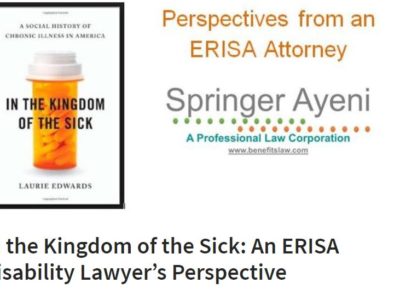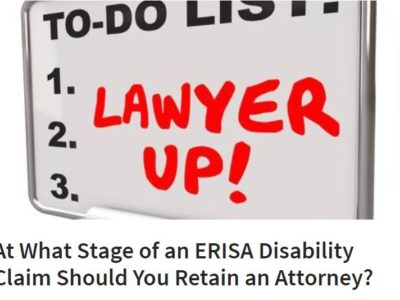Home » Blog Post » Can you get benefits when Lyme disease forces you out of your job?

Can you get benefits when Lyme disease forces you out of your job?
By Cassie Springer Ayeni
It happens: You’ve been working with Lyme disease for years and stumbling along. Some days/months are better than others, but you’ve been determined to keep working in a career you love. But then, gradually, it all becomes too much. You’re not bouncing back as well. Even though you rest from the moment you get home until when you leave for work the next day, giving up social engagements, relying on others to pick up the kids, and getting take-out dinners more than you would like, you are still struggling to get through the workday.
You see your doctor and she tells you the time has come for you to take some time off of work and focus on getting better. You are disabled from working. Now what? How will you live without your income? Here are some options and a plan.
- There Are Several Sources for Disability Benefits
Besides savings (and it is almost unheard of for someone in the prime of her working life to have sufficient savings to live decently for the rest of her days), income sources for people with disabilities include:
- ERISA-governed employee benefit plans (short-term disability then long-term disability). Long-term disability usually starts after 6 months and can last until retirement age.
- These benefits are usually tax-free if you paid the premiums with your after-tax earnings, but taxable if your employer paid the premiums.
- Private disability insurance plans (also lasting until retirement age).
- These benefits are usually not taxable.
- State disability insurance that usually last for a year (like California’s EDD).
- These benefits are usually not taxable.
- Social Security Disability Benefits (available after being disabled for six months and lasting through retirement age).
- These benefits are sometimes taxable, depending on your household income.
Here, I will focus on the first prong of these income sources: short- and long-term disability benefit plans offered by your employer. Many employers offer these group disability plans to all of their employees because the premiums are low and they can be a huge benefit to employees struck with a disability, whether short or long-term. Some employees never even realize that these benefits are in place, so be sure to check with HR or review your handbook as you are preparing to go out on disability.
However, a complex area of law called ERISA (the Employee Retirement Income Security Act) governs these employee benefit plans, even though you usually apply to an insurance company for payment of the benefits. Under ERISA, there are technical rules governing timelines for the insurance company to decide whether to pay your claim.
Even though you have a disability plan through your employer, you can still apply for all of the other disability benefits listed above. However, the benefits are usually coordinated so that you only receive a fixed percentage of your salary altogether, usually 2/3 or 60%.
- Your Doctor’s Role
Most people with Lyme disease have a long-standing relationship with a supportive doctor. This is instrumental to getting your disability benefit claims approved. Please make sure that your doctor knows how important it is that she fills out forms promptly so that your income stream can continue while you are not working. Here are some key tips for the “Attending Physician Statements” that you submit to the insurance company.
- Your doctor should answer the question “why is the patient disabled now?” especially if you have been working with Lyme disease for a while. Did it worsen? Is the fatigue getting the best of you? Is it now interfering with your ability to perform the activities of daily living, such as preparing meals? Ask your doctor to be specific and make sure this is in your medical record.
- Your doctor should point out that you are credible in your symptom reporting. When your doctor notes this, it helps prevent the insurance company from doubting your credibility, an unfortunately common reality when insurance companies are looking for a way to cut costs.
- Regularly schedule check-ups. Even though your condition may not get better with treatment, it is a good idea to see your doctor anyway every 6-12 months. This helps demonstrate to the insurance company that you are under the regular care of an attending physician. Also, insurance companies typically request medical records every 6-12 months.
- If you don’t already have an ERISA lawyer, you might want to check in with one now. Your lawyer can work with your doctor to get the forms filled out the right way the first time.
- Submitting the Application.
Finally, your doctor is on board and you have made the decision that resting without working is in the best interest of your health. Here is a checklist for your disability application:
- Request the short- and long-term disability application forms from HR.
- Request a copy of the short- and long-term disability policies from HR. These plan documents tell you some important information, like:
- The definition of disability. Make sure there is no “exclusion or limitation” for Lyme disease
- The Elimination Period. This tells you how long you have to be disabled before benefits start.
- The benefit amount. Typically this is 2/3 of your salary, when all sources of disability income are combined. There is often a “maximum” benefit, which high income earners need to be aware of.
- When the definition of disability “shifts.” Typically, for the first 24 months you are entitled to benefits if you are disabled from your regular occupation, and after 24 months you have to be disabled from “any occupation.”
- Duration of benefits. ERISA disability benefits usually last until retirement age or age 65, or until you are no longer disabled.
- The process for appealing a denied claim.
- Take a stab at filling out the application forms, but do not feel limited to the boxes on the forms. If you need extra space, include an addendum. If the question on the form doesn’t really apply to you, modify the question and answer to state what needs to be said about why you are disabled.
- Make sure that your employer knows they will have to fill out a form verifying your income and job duties.
- If it’s too overwhelming, ask an ERISA attorney to check your work to make sure that your application gives you the best shot at success. A skilled ERISA attorney will look for problems in your draft, and will also supplement an application with declarations and other information that will help an approval from the outset.
- And, if your application is denied, you must engage in the “appeals process” with the insurance company by the deadline, or you will lose your right to your claim. The appeal needs to contain ample medical and other evidence in support of your claim; it must be more than a letter stating “I appeal.” However, coming from someone who has handled hundreds of these appeals, you should never attempt to appeal on your own without the benefit of legal advice. The appeal stage is crucial, as you may be limited to the evidence of disability you present at this stage if you ever have to go to court.
Cassie Springer Ayeni is the President and Founder of Springer Ayeni, A Professional Law Corporation, in Oakland, CA, where she focuses on ERISA disability and life insurance cases. She can be reached at cassie@benefitslaw.com or www.benefitslaw.com.





